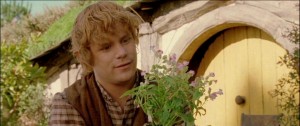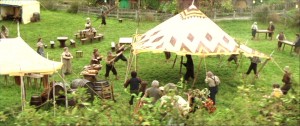“Concerning Hobbits,” revised
 Besides the opening tracking shot, there are three other moments in “Concerning Hobbits” that are specific to LOTR and could conceivably require modification when the sequence is moved to the later — oops, I mean earlier — trilogy. The interrupting knocks on the door belong to the Long Expected Party, a year later, so we’ll use an alternate or truncated take of the shot of Bilbo laughing at “nor counted among the very wise,” one without the very end of the shot, where he reacts to the first knock.
Besides the opening tracking shot, there are three other moments in “Concerning Hobbits” that are specific to LOTR and could conceivably require modification when the sequence is moved to the later — oops, I mean earlier — trilogy. The interrupting knocks on the door belong to the Long Expected Party, a year later, so we’ll use an alternate or truncated take of the shot of Bilbo laughing at “nor counted among the very wise,” one without the very end of the shot, where he reacts to the first knock.
There is a shot of Sam to illustrate the fact that “all hobbits share the love of things that grow,” and in theory that’s now in the wrong movie. But it plays no role in establishing his character for FOTR, and the prologue is filled with close-up shots of many other distinct hobbit faces, most of whom we never see again. The shot can thus can be left in when the sequence is moved to The Hobbit, as very long-range foreshadow and the subtlest of connecting threads between the tales — something to delight future viewers when they watch all six parts of the UE for the second time.
The only truly problematical sequence in “Concerning Hobbits” proper is the final 19 seconds before Bilbo is interrupted for the second time by a knock on the door: the montage of preparations on the party field climaxing with the raising of the “Happy Birthday Bilbo Baggins” banner. As we’ve moved the action back a full year, this no longer makes sense; Bilbo certainly didn’t celebrate his birthday with a massive outdoor party two years in a row. The voice-over narration will thus need to be accompanied by new footage. “And yes, no doubt to others, our ways seem quaint” will be illustrated with some specific comic image, probably one already shot expressly for that purpose (but if not, you don’t suppose they have any extra unused hobbit footage, do you?).
The continuation is more interesting: “but today, of all days, it is brought home to me that it is no bad thing to celebrate a simple life” could well be accompanied by a montage of a small, private 110th birthday party inside of Bag-End. In fact, that removes the unintended irony of celebrating a simple life with the most elaborate party in the history of the Shire.
And it’s now that we run into one of the two major challenges of the re-edit, because in LOTR Bilbo’s narration continues beyond the end of “Concerning Hobbits” for another 29 seconds, superimposed over four shots of Gandalf’s cart making its way towards Bag End.
 But what was the purpose of this continuation? It begins with more of the same: “So life in the Shire goes on, very much as it has this past age, full of its own comings and goings, with change coming slowly, or not at all.” (Note that in the AUJ UE, this will have to be illustrated by new hobbit footage.) But then it ceases to be about hobbits and becomes more personal. “For things are made to endure in the Shire, passing from one generation to the next.” (This section also needs new footage, showing us Bag End and some of its contents.) “There has always been a Baggins living under the Hill…” We see Bilbo sitting and looking very contemplative, and he says quietly “And there always will be.”
But what was the purpose of this continuation? It begins with more of the same: “So life in the Shire goes on, very much as it has this past age, full of its own comings and goings, with change coming slowly, or not at all.” (Note that in the AUJ UE, this will have to be illustrated by new hobbit footage.) But then it ceases to be about hobbits and becomes more personal. “For things are made to endure in the Shire, passing from one generation to the next.” (This section also needs new footage, showing us Bag End and some of its contents.) “There has always been a Baggins living under the Hill…” We see Bilbo sitting and looking very contemplative, and he says quietly “And there always will be.”
Now, this works beautifully in the existing edit, because Bilbo is about to leave Bag End to Frodo, and that explains why is he is thinking such thoughts. But the next time we see Bilbo in the existing edition, he’s in a panic over misplacing the Ring, and that doesn’t follow at all. What would follow well, however, is a scene between Bilbo and Frodo, one where the close bond between them is evident. So this very effective moment in FOTR doubles as a secret segue from “Concerning Hobbits” to the first scene proper of the movie we’ll be seeing this December.
There’s only one thing I can’t make work here. Any shots in the AUJ frame story that show the “No admittance” sign on the Bag End gate (such as the one that starts the first trailer) belong to 1401, rather than 1400. They might be omitted, inserted into the FOTR opening, or altered digitally to remove the sign. Or I might be wrong about most or all of this. That’s one of the reasons I plan to see the movies.


